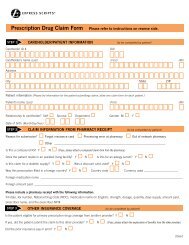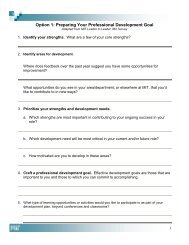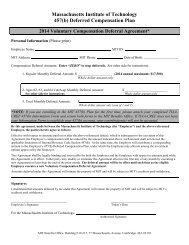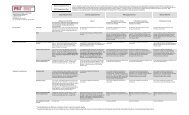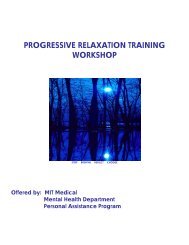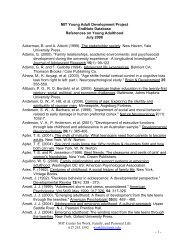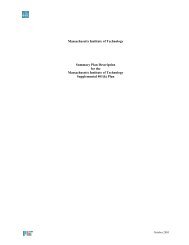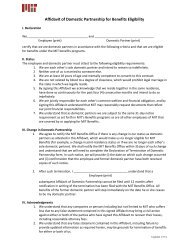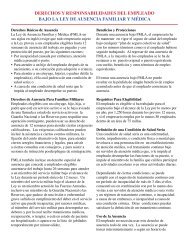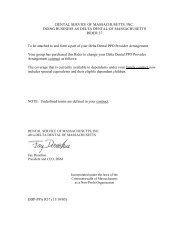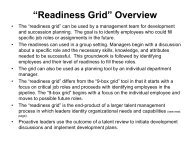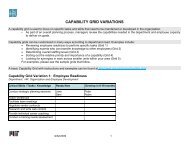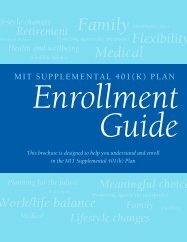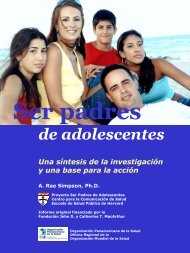Helping parents in developing countries improve adolescents' health
Helping parents in developing countries improve adolescents' health
Helping parents in developing countries improve adolescents' health
You also want an ePaper? Increase the reach of your titles
YUMPU automatically turns print PDFs into web optimized ePapers that Google loves.
of conceptual models, theories and bodies of research. However, most projects are<br />
unaware of the concept of roles <strong>in</strong> parent<strong>in</strong>g, and of the importance of emphasiz<strong>in</strong>g<br />
particular roles <strong>in</strong> achiev<strong>in</strong>g particular outcomes. Most strik<strong>in</strong>gly, some programmes<br />
with target outcomes, <strong>in</strong>clud<strong>in</strong>g chang<strong>in</strong>g risky sexual behaviour, have typically not<br />
focused their parent<strong>in</strong>g <strong>in</strong>terventions on behavioural control.<br />
• Design<strong>in</strong>g curricula: Exist<strong>in</strong>g curricula often do not fit a given project’s target<br />
population and culture, and creat<strong>in</strong>g a new curriculum is time-consum<strong>in</strong>g. Also,<br />
<strong>parents</strong> with low literacy pose added challenges. Some programmes are solv<strong>in</strong>g this<br />
problem by adapt<strong>in</strong>g exist<strong>in</strong>g curricula, sometimes blend<strong>in</strong>g parts of 2 or 3 curricula.<br />
The Youth Intervention Programme <strong>in</strong> Kenya, target<strong>in</strong>g sexual and reproductive <strong>health</strong><br />
<strong>in</strong> adolescents, adapted a US-based curriculum (the Parents Matter! Programme)<br />
for its parent component, as well as two US-based curricula for its adolescent-focused<br />
materials (Mak<strong>in</strong>g a Difference and Mak<strong>in</strong>g Proud Choices). Of the 34 projects<br />
identified <strong>in</strong> 2006, 21 projects had developed their own curricula or guides, and 6<br />
had adapted pre-exist<strong>in</strong>g materials, either from other develop<strong>in</strong>g <strong>countries</strong> or from<br />
the United States.<br />
• Poverty, fam<strong>in</strong>e, homelessness, domestic violence and war: Desperate conditions<br />
require <strong>parents</strong> to turn their attention to survival needs, and often prevent them<br />
from focus<strong>in</strong>g on adolescents’ behaviour. Also, the psychological impact of<br />
trauma and neglect is passed from generation to generation. When <strong>parents</strong> have not<br />
experienced, for example, connection and safety <strong>in</strong> their own childhoods, it is difficult<br />
for projects to foster it with one-off activities.<br />
• Susta<strong>in</strong>ability and scale: Most projects are donor-driven, and fund<strong>in</strong>g patterns<br />
tend to encourage projects that are biased toward prevention of immediate, shortterm<br />
negative outcomes rather than promotion of long-term protective factors. Lack<br />
of resources, <strong>in</strong>clud<strong>in</strong>g funds and technical knowledge, also prevent programmes<br />
from conduct<strong>in</strong>g the k<strong>in</strong>ds of evaluation that are needed for long-term susta<strong>in</strong>ability.<br />
Good Parent<strong>in</strong>g Calendar<br />
28 <strong>Help<strong>in</strong>g</strong> <strong>parents</strong> <strong>in</strong> develop<strong>in</strong>g <strong>countries</strong> <strong>improve</strong> adolescents’ <strong>health</strong>



